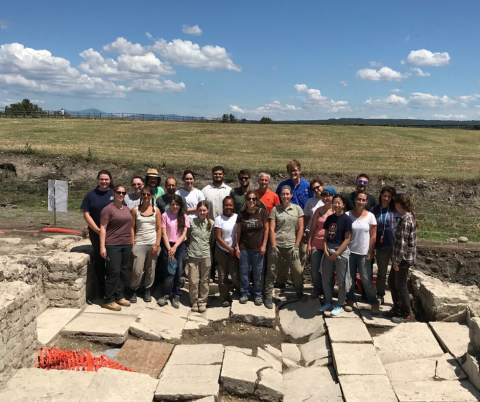Smart Archaeology (2018-2019)
Smart technologies involve the use of different collaborative and intelligent tools able to automatize several activities performed in the environment and in everyday objects, such as the case of the Internet of Things. In archaeology, smart technologies can include sensors, close range sensing systems, robots, rovers, drones, laser scanners and specific software able to process data from multiple sources. The impact of smart technologies in the next decades will be revolutionary also for the social sciences, the humanities and the sciences of the past.
This multiyear project team has developed a robust technological and interdisciplinary workflow, from digital data capturing to virtual simulation, archiving and visualization. In 2018-2019, the team focused on the archaeological investigation and study of ancient important cities of the Mediterranean dating back to the first millennium BCE. Vulci (Viterbo, Italy) was one of the most important Etruscan city-states, and Duke is the first university with a permit of excavation in the last 60 years.
During the summer of 2018, the team worked with a specialized Ground Penetrating Radar (GPR) team to complete a resistivity survey. GPR is a technology that sends pulses of radar energy into the ground and records the elapsed time and strength of the returning signal. The team combined these findings with a spatial analysis to discover domestic structures, rows of columns and a ‘basilica’ – a large porticoed space that fulfilled a public function. Through their excavation efforts, the team uncovered an Augustan-age building with an Etruscan cistern hidden underneath the travertine floor. The team plans to return to the field site with a new archaeorobot and drone sensors in 2019-2020.
Timing
Summer 2018 – Spring 2019
Team Outputs
Maurizio Forte, Fondazione Luigi Rovati: Vulci 3000 Project ($57,300 grant awarded from Fondazione Luigi Rovati, 2018)
Secrets Beneath the Surface: Using Today’s Technology to Discover Vulci’s Past (poster by Katherine McCusker, Maurizio Forte, presented at Bass Connections Showcase, Duke University, April 17, 2019)
Video
This Team in the News
Faculty Perspectives: David Johnston
Cutting-edge Imaging Technologies Enable a New View of an Ancient City
Drone Built by Duke Students Creates 3D Map
Meet the 2019 Recipients of Bass Connections Student Research Awards
Helen Healey, Documentary Filmmaker for an Archaeological Excavation
See related teams, Smart Archaeology (2019-2020) and Digital Cities and Cyberarchaeology (2017-2018).

Team Leaders
- Maurizio Forte, Arts & Sciences-Classical Studies
- David Johnston, Nicholas School of the Environment-Marine Science and Conservation
- Regis Kopper, Pratt School of Engineering-Mechanical Engineering & Materials Science
- William Seaman, Arts & Sciences-Art, Art History, and Visual Studies
/graduate Team Members
-
Katherine McCusker, Art and Art History-AM, Art and Art History-PHD
/undergraduate Team Members
-
Helen Healey, Visual and Media Studies (AB)
-
Ashley (Hojung) Kwon, Computer Science (BS)
-
Jasmine Lu, Electrical & Computer Egr(BSE)
-
Wenqin Wang, Computer Science (BS)
-
Hongxuan (Max) Wang, Mechanical Engineering (BSE)
/yfaculty/staff Team Members
-
Todd Berreth, North Carolina State University
-
Nevio Danelon, Arts & Sciences-Art, Art History, and Visual Studies
